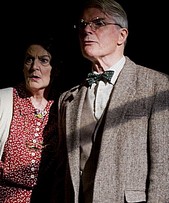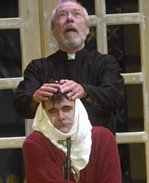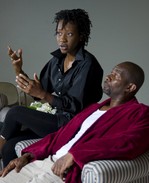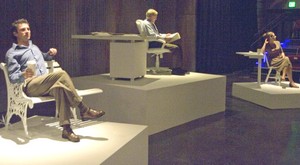SITE GUIDE
SEARCH
REVIEWS
FEATURES
NEWS
Etcetera and
Short Term Listings
LISTINGS
Broadway
Off-Broadway
NYC Restaurants
BOOKS and CDs
OTHER PLACES
Berkshires
London
California
New Jersey
DC
Philadelphia
Elsewhere
QUOTES
TKTS
PLAYWRIGHTS' ALBUMS
LETTERS TO EDITOR
FILM
LINKS
MISCELLANEOUS
Free Updates
Masthead
Writing for Us
CurtainUp In the Berkshires
Shakespeare & Company Summer 2009 Season
By Elyse Sommer
Last Updated: August 18, 2009Main Stage (Founders Theater) Reviews: Twelfth Night | Hamlet (Reprised)
Elayne P. Bernstein Theater Reviews: White People | The Dreamer Examines His PillowDevil's Advocate | Pinter's Mirror| Shirley Valentine|
About this All-In-One Format: These omnibus pages for individual theater organizations include facts about the entire schedule even though our limited human resources may not make it possible to review all the shows. However, every show reviewed will be added on this page. If you're looking for something seen in past seasons, click on our Berkshires archives . A click on a show listed here will jump you down to our review,
Visit CurtainUp's Friends Curtainup at Facebook . . . Curtainup at Twitter Subscribe to our FREE email updates with a note from editor Elyse Sommer about additions to the website -- with main page hot links to the latest features posted at our numerous locations. To subscribe, E-mail: esommer@curtainup.comesommer@curtainup.com put SUBSCRIBE CURTAINUP EMAIL UPDATE in the subject line and your full name and email address in the body of the message -- if you can spare a minute, tell us how you came to CurtainUp and from what part of the country. |
Shakespeare & Company
70 Kemble St., Lenox, (413) 637–1199
Schedules vary enormously, so check the company's Web Site.
Overview of the company's summer. The aim is to meet the challenges inherent in this economic climate, by offering a full menu but with an eye on the budget. This means a number of offerings are replays of what the company considers its biggest hits-- keeping rehearsal time, costume and other costs in check.
Main Stage (Founders Theater) Reviews Hamlet--Reprised
70 Kemble St., Lenox, (413) 637–1199
Schedules vary enormously, so check the company's Web Site.
Overview of the company's summer. The aim is to meet the challenges inherent in this economic climate, by offering a full menu but with an eye on the budget. This means a number of offerings are replays of what the company considers its biggest hits-- keeping rehearsal time, costume and other costs in check.
Main Stage (Founders Theater) Reviews Hamlet--Reprised
| The Company's Fast-Paced, Entertaining and Intriguingly Cast Hamlet Returns to the Founders Theater
A Second Look by Elyse Sommer Since Shakespeare & Company's first staging of what is probably the Bard's greatest "hit" and for sure, the one that has as many memorable bits and pieces of dialogue as a flowering plant has blossoms, CurtainUp has reviewed several other Hamlets with dynamic young actors to play the unhappy Danish prince (Jude Law at London's Donmar and Christian Carmago for Theatre for a New Audience--the Law Hamlet will tranfer to Broadway this fall and TFNA will remount the Carmago Hamlet as well as its Othello!). Though Jason Asprey is less well known than either Law or Carmago, his playing the prince has an intriguing familial twist in that the mother who, like everyone else around him has disillusioned him, is played by his real life mum, Tina Packer, and Dennis Krausnick, his stepfather, plays Polonius who, were this not a tragedy, might have been his father-in-law. Asprey is still more volatile and angry, than melancholy, but his line readings are spoken with welcome clarity, which is true of the entire cast in this as the many other Shakespeare plays this company has done. His fiery Hamlet is as eminently watchable as it was during the summer 2006 premiere. And so, except for a few comments about the current revival and production notes with cast changes, my initial review applies now as then and is therefore posted here, following some brief update notes. Tina Packer, Nigel Gore, Dennis Krausnick and Elizabeth Raetz again play the key characters. Packer seems even more restrained than in the past. d Raetz, while again impressive in her gone mad scene, still seems too grounded in her first scenes not to make her descent into madness a bit too abrupt (the script streamlining probably has something to do with the plot feeling a bit rushed in spots). Time and the production's touring performances have strengthened Nigel Gore's Claudius. He's now more menacing and conflicted. Dennis Krausnick's has sharpened his somewhat too restrained Polonius and deservedly got the biggest laughs at the opening performance I attended. The new actors have taken over the various other parts previously played by others without any stumbles. Johnny Lee Davenport rates a speical round of applause as the ghost of the slain King, the Player King and the gravedigger. The staging and costumes appear unchanged. Scott Killian's use of fluorescent lights is as clever and evocative as I recall. Director Eleanor Holdridge's high concept opening, seems to have been toned down (a good thing). As for the fight scene, though probably not changed from the original, it struck me as too rushed this time around. But then, it's the price for Hamlet and Laertes' lively sword play (bravo Kevin G. Coleman!) and killing everyone off in just a tad more than 3 hours. To read some of Curtainup's reviews of all manner of Hamlet productions, ranging from classic to one version without any dialogue, check out our Shakespeare page. Summer 2009 Production Notes (*Asterisks indicate the same actors/creatives as in the 2006 premiere production Hamlet by William Shakespeare) Director: *Eleanor Holdridge Cast (Alphabetical Order): *Jason Asprey (Hamlet), Stephen James Anderson (Laertes--Anderson originally played Fortinbras), Andrew Borthwick-Leslie ((Guildenstern/Osric), Johnny Lee Davenport (Ghost/Player King/Gravedigger) *Nigel Gore (Claudius), *Dennis Krausnick (Polonius), *Tina Packer (Queen Gertrude), *Elizabeth Raetz (Ophelia), Alexander Sovronsky (Rosencrantz/English Ambassador), Enrico Spada (Fortinbras), Jake Wald(Horatio) Composer/Sound Designer: *Scott Killian Costume Designer: *Jessica Ford Set Designer: *Ed Check Lighting Designer: *Les Dickert Fight Choreographer: *Kevin G. Coleman Stage Manager: Nicole Bouclier June 26 - Aug 28. Re-reviewed by Elyse Sommer at June 27th press Opening |
Hamlet is probably more richly studded with Shakespeare's choicest quotes and produced more than any play in his canon. Yet this is the first time in Shakespeare & Company's 29 seasons that the Bard's Danish royals in whose kingdom something is decidedly rotten are being given a Main Stage production.
Three of the main characters are off-stage kin: Queen Gertrude, who has married her husband's brother and murderer is played by the company's founder and artistic director Tina Packer. Gertrude's appalled and grief-stricken son Hamlet is played by Packer's real life son, Jason Asprey. Dennis Krausnick, Packer's husband and Asprey's step-dad, is cast as Polonius, the wisdom spouting member of the Claudius-Gertrude court ("to thine own self be true" . . . "neither a borrower or a lender be"), and father of Hamlet's potential betrothed, Ophelia.
Typical of Shakespeare & Company's productions, this ever fascinating tale of murder, treachery and madness is staged with a small cast (eliminating some characters and double casting others) and without a lot of elaborate scenery. The few props, like the costumes, are modern -- a lucite chair on wheels, a bed instead of a whole boudoir, a box that can metamorphose into a grave.
Director Eleanor Holdridge has put her own spin on the opening scene. No battlement with sentinels, just Hamlet on a dark stage made visible by a burst of intense light as he delivers a fragmentary soliloquy that includes such famous utterances as "to be or not to be."
According to the director's notes, that jarring light symbolize "the electrical synapse impulses of Hamlet's dying brain, creating flashes of memory or imagination." In short the feverish opening speech is a dying man's jagged recap of the father's death and consequent madness and conundrums he has experienced.
Whether you buy Holdridge's concept or not, it certainly makes for a striking opening. Happily, what follows has enough dramatic flair and substance to keep you engaged throughout the story of a son faced with his father's death, his mother's transformation into love-smitten bride of his duplicitous uncle and his own role as the disenfranchised ruler of the kingdom -- plus the parallel tragedy of Ophelia and Laertes, the children of another murdered father. Les Dickert and Scott Killian's stunning light and sound effects so permeate the entire production that they function as characters in their own right and more than compensate for the spare scenery.
With a completely unabridged Hamlet averaging at least four hours, this somewhat condensed, highly stylized three hour production moves at a nonstop pace, its plot easy to follow and the dialogue spoken with absolute clarity.
The actors' modern attire is not a means for any drastic alterations in terms of time or place, though the colors have strong metaphoric implications. Hamlet wears black throughout to underscore his glum and mournful mood (except for tiny bit of red which foreshadows the bloodshed to come). Queen Gertrude first appears in a bright blue outfit reminiscent of the current British monarch's insistently cheery pastel ceremonial getups, in the bedroom scene her dress is bloody red and, eventually she too is in mourning colors; Claudius and Polonius sport typical corporate grey suits with touches of color in the best Armani/ Brooks Brothers fashion.
While the title role is often considered as a major milestone in a mature actor's career, this Hamlet is very much a young man's play. Given his youth, Asprey acquits himself very well though he probably needs a few more years onstage to bring all the variations of mood and texture to this demanding role. As it is, his prince tends to be more fiercely outraged and out of control than melancholy and indecisive, which makes scenes like the boudoir confrontation with his mother stand out.
The young man's play focus is strongly supported by Howard W. Overshown as Hamlet's friend Horatio; also Kevin O'Donnell as Laertes and Stephen James Anderson as Fortinbras, the play's other sons dealing with the loss of a father. The ebullient and dynamic Tina Packer cedes center stage to her on/offstage son and plays Gertrude with wonderful restraint. Even greater restraint (in fact, almost too much) is evident Dennis Krausnick's Polonius. Nigel Gore's Claudius is fine, though he could do with a bit more menace and inner turmoil.
In the perennially difficult role of Ophelia, Elizabeth Raetz, after a somewhat silly Valley Girl/Chick Flick/Flower Child entrance, rouses our sympathy with a wrenching descent into madness. For a touch of camp, Holdridge has turned Hamlet's friends Rosenkrantz and Guildenstern, the two minor characters given a clever play of their own by Tom Stoppard, into two colorful fops. They are played with panache by Tom Wells and Kenajuan Bentley. A triple round of applause to John Windsor-Cunningham for all three of his roles -- as King Hamlet's Ghost, the player king and a grave digger.
Of the many standout moments that make the play seem shorter than three hours perhaps the most moving are the burial scenes. The most controversial directorial touch is likely to be Holridge's staging of the play within a play scene which has Hamlet force the King and Queen to be active participants. I quite liked it though I can see where others are apt to have different views about this -- but then it's the play's adaptability to new interpretation and ongoing ability to seed lively post-curtain discussions that has kept it at the top of the Bardian favorites list.
Hamlet is probably more richly studded with Shakespeare's choicest quotes and produced more than any play in his canon. Yet this is the first time in Shakespeare & Company's 29 seasons that the Bard's Danish royals in whose kingdom something is decidedly rotten are being given a Main Stage production.
Three of the main characters are off-stage kin: Queen Gertrude, who has married her husband's brother and murderer is played by the company's founder and artistic director Tina Packer. Gertrude's appalled and grief-stricken son Hamlet is played by Packer's real life son, Jason Asprey. Dennis Krausnick, Packer's husband and Asprey's step-dad, is cast as Polonius, the wisdom spouting member of the Claudius-Gertrude court ("to thine own self be true" . . . "neither a borrower or a lender be"), and father of Hamlet's potential betrothed, Ophelia.
Typical of Shakespeare & Company's productions, this ever fascinating tale of murder, treachery and madness is staged with a small cast (eliminating some characters and double casting others) and without a lot of elaborate scenery. The few props, like the costumes, are modern -- a lucite chair on wheels, a bed instead of a whole boudoir, a box that can metamorphose into a grave.
Director Eleanor Holdridge has put her own spin on the opening scene. No battlement with sentinels, just Hamlet on a dark stage made visible by a burst of intense light as he delivers a fragmentary soliloquy that includes such famous utterances as "to be or not to be."
According to the director's notes, that jarring light symbolize "the electrical synapse impulses of Hamlet's dying brain, creating flashes of memory or imagination." In short the feverish opening speech is a dying man's jagged recap of the father's death and consequent madness and conundrums he has experienced.
Whether you buy Holdridge's concept or not, it certainly makes for a striking opening. Happily, what follows has enough dramatic flair and substance to keep you engaged throughout the story of a son faced with his father's death, his mother's transformation into love-smitten bride of his duplicitous uncle and his own role as the disenfranchised ruler of the kingdom -- plus the parallel tragedy of Ophelia and Laertes, the children of another murdered father. Les Dickert and Scott Killian's stunning light and sound effects so permeate the entire production that they function as characters in their own right and more than compensate for the spare scenery.
With a completely unabridged Hamlet averaging at least four hours, this somewhat condensed, highly stylized three hour production moves at a nonstop pace, its plot easy to follow and the dialogue spoken with absolute clarity.
The actors' modern attire is not a means for any drastic alterations in terms of time or place, though the colors have strong metaphoric implications. Hamlet wears black throughout to underscore his glum and mournful mood (except for tiny bit of red which foreshadows the bloodshed to come). Queen Gertrude first appears in a bright blue outfit reminiscent of the current British monarch's insistently cheery pastel ceremonial getups, in the bedroom scene her dress is bloody red and, eventually she too is in mourning colors; Claudius and Polonius sport typical corporate grey suits with touches of color in the best Armani/ Brooks Brothers fashion.
While the title role is often considered as a major milestone in a mature actor's career, this Hamlet is very much a young man's play. Given his youth, Asprey acquits himself very well though he probably needs a few more years onstage to bring all the variations of mood and texture to this demanding role. As it is, his prince tends to be more fiercely outraged and out of control than melancholy and indecisive, which makes scenes like the boudoir confrontation with his mother stand out.
The young man's play focus is strongly supported by Howard W. Overshown as Hamlet's friend Horatio; also Kevin O'Donnell as Laertes and Stephen James Anderson as Fortinbras, the play's other sons dealing with the loss of a father. The ebullient and dynamic Tina Packer cedes center stage to her on/offstage son and plays Gertrude with wonderful restraint. Even greater restraint (in fact, almost too much) is evident Dennis Krausnick's Polonius. Nigel Gore's Claudius is fine, though he could do with a bit more menace and inner turmoil.
In the perennially difficult role of Ophelia, Elizabeth Raetz, after a somewhat silly Valley Girl/Chick Flick/Flower Child entrance, rouses our sympathy with a wrenching descent into madness. For a touch of camp, Holdridge has turned Hamlet's friends Rosenkrantz and Guildenstern, the two minor characters given a clever play of their own by Tom Stoppard, into two colorful fops. They are played with panache by Tom Wells and Kenajuan Bentley. A triple round of applause to John Windsor-Cunningham for all three of his roles -- as King Hamlet's Ghost, the player king and a grave digger.
Of the many standout moments that make the play seem shorter than three hours perhaps the most moving are the burial scenes. The most controversial directorial touch is likely to be Holridge's staging of the play within a play scene which has Hamlet force the King and Queen to be active participants. I quite liked it though I can see where others are apt to have different views about this -- but then it's the play's adaptability to new interpretation and ongoing ability to seed lively post-curtain discussions that has kept it at the top of the Bardian favorites list.
Othello July 3 - Sept 6. Another Shakespeare hit, this one from last season, being given a return engagement. While I had some reservations about some of Tony Simotes' directorial choices and the casting of Michael Hammond as the nasty Iago, there was no question about the star power of John Douglas Thompson's Othello. Thompson received even more acclaim when he played the jealousy maddened king Off-Broadway with Theater For a New Audience (different director and cast) so he now returns with a stack of rave reviews and several Best Actor Awards. For a review of last summer's production, Othello--Summer 2008 production. Cast members for the latest permutation Simotes will direct returning cast members Michael Hammond (Iago), Merritt Janson (Desdemona), Tom Rindge (Duke of Venice/Soldier), John Douglas Thompson (Othello), Michael F. Toomey (Montano/Senator), Ryan Winkles (Roderigo), and Kristin Wold (Emilia); alongside newcomers Duane Allen (Cassio), Robert Biggs (Lodovico/Soldier), Ken Cheeseman (Brabantio/Soldier), and Caley Milliken (Bianca/Servant).
Editor's Note: With TNFA remounting last season's Othello (as well as its Hamlet) and the Public Theater having scheduled an Othello co-starring John Ortiz and Phillip Seymor Hoffman, I'm not re-reviewing the Shakespeare & Company production in the interest of avoiding an Othello overdose.
Twelfth Night
Reviewed by Gloria Miller
|
Youth's a stuff will not endure.
<— Feste
|

Ryan Winkles (Sir Andrew), Nigel Gore (Sir Toby)
(Photo: Kevin Sprague ) |
All of this tomfoolery is deftly engineered by director Jonathan Croy into a highly entertaining, high-spirited romp which manages to touch on but not dwell on grief, madness, sexual ambiguity, cruelty and utter despair. Croy's comedic irreverence and a cast of superb and well-honed actors and buffoons mine Shakespeare's words for every finely nuanced and broadly painted satiric and comedic element. The brilliance of Nigel Gore and Ryan Winkles as Sir Toby Belch and Sir Andrew Aguecheek abetted by Alexander Sovronsky's Fabian dazzles the audience with their antics as they create a chaotic universe where logic and order are perverted by a need to overturn social norms. Maria (Corinna May) adds to the merriment with her clever ruse to humble Ken Cheeseman's arrogant, bombastic Puritan, the deserving butt of their cruel yet hilarious intrigues. Think of the Marx Brothers and Margaret Dumont, but on a more outrageous physical level.
Though the main plots of Duke Orsino's monomaniacal pursuit of the persistently mourning Olivia and the separated and assumed dead twins, Viola and Sebastian, are almost secondary to the antics of S&C's stellar comedians, the actors manage to keep us riveted to the plight of these lovers as they sort through their own amorous intrigues and futile passions. Olivia, played by Elizabeth Raetz, is the grief-stricken recluse who refuses Orsino's advances. But when aroused by the disguised Viola's Cesario she unleashes a passion that is both touching and hilarious. Viola (Merritt Janson) is both wise and exuberant as she flees Olivia's advances, while pining for Orsino's love and grieving the loss of her own supposed dead brother. Duane Allen Robinson's Orsino is lovelorn but manly, and when he finally comes to his senses, a real match for the very strong yet feminine Viola.
Robert Biggs as the fool Feste is the glue that holds this entire madcap production together. He aids the other plotters, yet supplies the deeper philosophical comments about lie, art, love and death that raises “Twelfth Night” to elegiac heights. Biggs sings original songs and invites the audience to participate which adds a sense of Renaissance flavor and lyrical beauty to the production.
The colors and details of the costumes by Govane Lohbauer, the lighting by Les Dickert and simple yet functional set by Croy add to the fluidity of the actors' cavorting. This is a fine production to introduce young audience members to Shakespeare's canon.
PRODUCTION NOTES:
Twelfth Night by William Shakespeare
Directed by Jonathan Croy
Musical Director: Adam Jones
Cast: (In alphabetical order) Robert Biggs (Feste), Ken Cheeseman (Malvolio), Johnny Lee Davenport (Antonio/Valentine), Nigel Gore (Sir Toby Belch), Merritt Janson (Viola), David Joseph (Sea Captain/First Officer), Alexandra Lincoln (Gentlewoman/Second Officer), Robert Lohbauer (Curio/Priest), Corinna May (Maria), Elizabeth Raetz (Olivia), Duane Allen Robinson (Duke 0rsino), Alexander Sovronsky (Fabian), Jake Waid (Sebastian), Ryan Winkles (Sir Andrew Aguecheek)
Set: Jonathan Croy
Lighting: Les Dickert
Costumes: Govane Lohbauer
Sound: Michael Pfeiffer
Original Music Composed by Robert Biggs, and Bill Barclay with Alexander Sovronsky
Stage Manager:Hope Rose Kelly
July 4 to September 5
Running Time: 3 hours, including one intermission
Reviewed by Gloria Miller at August 14th performance
Elayne P. Bernstein Theatre:
This theater which opened last summer is bustling with activity. Plays on offer:
Pinter's Mirror, a triptych of Harold Pinter plays— see review below.
The Diva Series (translation: solo shows starring strong female actors. This included reprises of Shirley Valentine (see review below) starring Tina Packer, the woman who made the vision of Shakespeare & Co. a reality; also first solo version of William Gibson's Golda's Balcony ( Review of the original 2002 production.
Another series under the umbrella title of Life Laid Bare featuring Donald Freed's Devil's Advocate, John Patrick Shanley's The Dreamer Examines His Pillow and J. T. Rogers' White People.
See the Shakespeare and Company site for more details and performance schedules.
Elayne P. Bernstein Theatre Reviews
Pinter's Mirror
A Slight Ache. . .Family Voices. . .Victoria Station
| I've never been able to write a happy play, but I've been able to enjoy a happy life. —Harold Pinter
|

Elizabeth Ingram & Malcolm Ingram in one of the one-acts comprising Pinter's Mirror
(Photo: Kevin Sprague ) |
The smartly directed and sublimely performed triptych of one-acts Shakespeare & Company is currently presenting is Pinter at his funniest and most Pinteresque. The bare bones staging —a drop cloth backing, some tables and chairs — fits these unconnected pieces perfectly and while not a theatrical equivalent of a "beach read," the two hours are challenging but never tedious and provide plenty of chuckles.
A Slight Ache, the longest and oldest (1961) of the trio, most closely fits the comedy of menace genre and also illustrate's Samuel Beckett's influence. While Flora (Elizabeth Ingram) and Edward (Malcolm Ingram) at first appear to be leading a tranquil, comfortable existence, their creator lives up to his above quoted admission about his inability to write a happy play. Flora may enjoy her blossoming garden, and Edward take pride in the esoteric essays he writes, but the spark has long gone out of their marriage. Ennui hangs over their togetherness like a London fog. She puts up with his pompous chauvinism. His take-charge assurance is easily assaulted by anything unknown or unfamiliar. And so, as his more tender-hearted wife watches uneasily, he proceeds to get rid of a wasp buzzing around their breakfast tea table by trapping it in the marmalade jar. When the wasp tries to escape its sweet suffocation through the spoon opening in the jar lid, Edward finishes it off by pouring boiling tea into this escape hatch.
The wasp is just a hint that Edward's stiff upper lip English surface is a facade beneath which fears of the unknown (old age, death?) buzz around as desperately as that wasp in the jam jar. The fear-stirring unknown in A Slight Ache, turns out to be a raggedy match peddler (Stephen Pilkington) who has stationed himself at the back gate. The peddler is harmless enough but Edward sees his position at a place with little foot traffic and likelihood of his making any sales as a threat and insists that Flora bring him into his study so that the mystery of his being there can be resolved. Though at first reluctant, the man does come in -- a shuffling, pitiful figure very much reminiscent of Lucky in Beckett's Waiting for Godot. Don't expect Pinter to explain who the tramp represents, but do expect his presence in this very English couple's quiet little house to turn absurd and kick up their unexpressed feelings in ways that make A Slight Ache as tragic as it is comic and Edward and Flora a variation of Godot's Vladimir and Estragen.
Since the tramp's face in the first play is completely hidden by a Balaclava (a ski mask type of headgear), we don't really get to see what Pilkington, a new member of the Shakespeare & Company acting family looks like until Family Voices. Though not on a par with the first play, this does focus on Pilkington and the young thespian does more than full justice to the part of a young man who's left his parents' (the Ingrams) home. Unsurprisingly, it again turns out not to be a happy one. Though the young man (known only as Voice 1) tries to connect with his mother (Voice 2) via affectionate letters, her responses make it clear that these letters never reach their destinatio— if they were, in fact, written or sent. As for the father (Voice 3), he spends most of the time in a reclining chair. According to the mother he's dead. (Or is he?).
The concluding playlet, originally written for the radio, is the slightest and least complex. A taxi dispatcher (Malcolm Ingram) tries to get cab #274 (Pilkington) to pick up a fare at Victoria Station. But the driver hasn't the vaguest notion of how to get to Victoria Station, nor does he apparently want to. The interchange in this two-hander is amusingly nonsensical, a nice way to unwind more than anything to unwind from it more tens and substantial predecessors.
A special shoutout to Kiki Smith for the spot-on outfits for each play and Greg Solomon for supporting the shift in mood with his evocative lighting. For more about Harold Pinter and links to other plays of his CurtainUp has reviewed, see our Pinter backgrounder Production Notes
Pinter's Mirror: A Slight Ache (1961), Family Voices (1980), Victoria Station (1981.
Playwright: Harold Pinter
Directed by Eric Tucker
Starring Elizabeth Ingram, Malcolm Ingram, Stephen Pilkington.
Set: Kiki Smith
Lighting Designer: Greg Solomon
Costume Designer: Megan Moriarty
Musical Designer: Michael Pfeiffer
Stage Manager: Molly Hennighausen
Running Time: Approximately 2 hours including an intermission after the 55-minute A Slight Ache
June 11 - August 2
Rviewed by Elyse Sommer June 25h
Shirley Valentine
| Marriage is like the middle east, isn't it? There's no solution. — Shirley
|

Tina Packer as Shirley Valentine
(Photo: Kevin Sprague) |
Russell's clever script gets Shirley telling stories to evoke her family and friends, One of the most charming and touching Shirley Valentines to grace a stage is Shakespeare & Company's enormously talented and ever youthful Tina Packer. I didn't see her when she previously undertook this role in 1991 and again in 1995 at the company's former home . Though she's now quite bit older than the 42-year-old envisioned by Russell, Packer charms and touches audiences with her portrayal of this woman's inspiring self-rescue from her unlived life, so that you forget the age factor — especially so these days when sixty is the new 45, and senior citizens are having romances and careers. Not that age isn't very much part of Packer's more rueful and profound moments that have her pause for "when I was a girl. . ." recollections of the carefree Shirley Valentine of her school days and wondering how she "got lost in all this unused life." Fearful as she is about leaving her insensitive husband, she is also aware of how so many of us die "having wasted a chance to ever use our hopes and dreams."
As Packer banishes all thoughts of age appropriateness because of the way she immerses herself into the role from the minute she enters the stage and pulls us in with the witty lines and the trenchant observation, so the minimal staging works just fine. Part of the company's aim to present a full menu but within an economy constrained budget, Kiki Smith's simple set design does not prevent us from getting the picture of the confining suburban home or the transforming atmosphere of the sunny Greek island where the final act takes place. No kitchen with a view of the street outside. No fancy sky, sun and sand for the island scene: just a few appliances and a table for the kitchen scenes, and a sky-blue plastic tarp and a sand-colored rug for the shift to Greece. But it's enough. This is all about the acting and the playwright's clever inside view of his character's mind and a timeless story of transformation without resorting to unrealistic escapist fantasy. Sure, Shirley gets away but she is smart enough to always realize that her romantic interlude is just that, and when she stays it's not to live with her Greek prince charming but to wait tables in his restaurant.
While the 90-minute, intermissionless play has become modern audiences preferred running times, especially for solo shows, thanks to Jenna Ware's direction and Packer's engaging performance, the two and a half hours move along at a much faster pace than all those years Shirley Valentine spent catering to her family's needs.
If you can't make this very limited run, you can at least get a taste of Tina Packer's performance by watching the video posted at the company's website— http://www.shakespeare.org/blog/2009/05/video-preview-shirley-valentine/
PRODUCTION NOTES:
Shirley Valentine, a solo play in 3 acts
Playwright: Willy Russell
Director: Jenna Ware
Starring Tina Packer
From May 27 - May 31 and September 11th 3:00 pm / 8:30 pm
Set Designer: Kiki Smith
Lighting Designer: Greg Solomon
Costume Designer: Govane Lohbauer
Sound Designer: Michael Pfeiffer
Stage Manager: Meredyth Pederson
Running Time: 2 1/2 hours, plus one 20-minute intermission -- with break after Act 2
Reviewed by Elyse Sommer May 27th
Devil's Advocate
| You're not the devil and I'm not your advocate<—Archbishop LaBoa |

Dennis Krausnick as Laboa (top) & Ignatius Anthony as Noriega
(Photo: Kevin Sprague) |
While dark roots are actually quite the cutting edge look these days, there's nothing especially cutting edge about the circumstances surrounding President George H. W. Bush's administration's invasion of Panama to remove strongman Manuel Antonio Noriega from his de facto head of state position and charged with drug trafficking, racketeering and money laundering. Oh, sure, you can find paralells between Noriega's trajectory from conveniently tolerated leader to intolerable arch enemy. However, when it comes to political conflicts in which the duplicity of foreign powers is shown to be matched by this country's leaders, Bush II's political misdeed are a much more likely box office draw than the sort of left of center polemical playwriting that's always been Donald Freed's specialty a box office draw.
Actually, Freed has written a play about Bush Junior (Patient #1) but that's not what's on offer as part of Shakespeare & Company's Life Laid Bare series. What we get is Noriega's story condensed into a fact and theory filled debate between the desperate Noriega and Archbishop Laboa. Despite the dramatic soundscape and lighting and the actors' and director's valiant efforts, Devil's Advocate is essentially a political diatribe rather than a memorable, convincingly structured play that entertains as it enlightens.
To check on whether I was alone in my sense that Noriega's story no longer serves as a particularly vivid case to prompt us to reflect on the political misdeeds of dictators like him and our own leaders, I informally queried close to a dozen people as to their familiarity with Noriega's tenure as Panama's leader and his downfall. Only one person knew that he was never more than a de facto president. No one knew the specifics of his imprisonment, whether he was dead or alive (he's alive). While Freed certainly packs a lot of information into the hour and forty minutes and it's hard not to agree with him about our depressing history of political hypocrisy, the docudramatic sounds outside the Vatican Embassy (including the recorded voice of President George H W Bush) do little to make the encounter between Noriega and the ailing Archbishop less of a histrionic rant. As this imagined battle of wills plays out with the Archbishop absolving Noriega from being a devil but nevertheless refusing to be his advocate, Freed resorts to melodramatic psychology to portray Noriega as a poor, uneducated boy seduced into villainy by powerful American forces (specifically the CIA).
If you're not averse to such convenient psychobabble driven shtick you may just enjoy watching the husky Ignatius Anthony strip to his undershorts and finally exit the Embassy back in his full military regalia — you may even believe that a Roman Catholic Archbishop would condemn his church for indulging in the same uncivilized behavior as the Capitalist super powers.
Production Notes:
Devil's Advocate By Donald Freed
Directed by Dee Evans and Clare Reidy
Cast: Dennis Krausnick as Archbishop Jose Sebastian Laboa and Ignatius Anthony as Manuel Antonio Noriega
Lighting: Greg Solomon
Costumes: Jim Day
Sound Michael Pfeiffer
Stage Manager: Molly Hennighausen
July 30 - August 16
Running Time: approsimately 1 hour and 45 minutes without intermission
Presented by Shakespeare & Company in association with the Mercury Theatre Company UK.
Reviewed by Elyse Sommer on August 1st
The Dreamer Examines His Pillow
| I hate kids --especially my own. —Dad
|

John Douglas Thompson and Miriam Hyman
(Photo: Kevin Sprague ) |
Dreamer. . . is not seen much on the revival circuit, perhaps because it's excessively talky but fails to turn its monologues and confrontational conversations into a dramatically muscular play; also because Shanley has been prolific enough to make it unnecessary to dig into his trunk of old scripts. Credit Shakespeare & Company therefore, for incorporating it into its Life Laid Bare series and giving director Tod Randolph a chance to overcome the play's weaknesses and tease out the universality of its concerns with communication between lovers and also between parents and children. To ramp up that universality, Randolph has smartly cast her production with African-American actors which brings freshness and vibrancy to Shanley's Bronx-accented dialogue.
Miriam Hyman seethes with passion and rage as Donna, as does Bowman Wright as Tommy, whose love for her is intense but conflicted. But sizzling with the oil and water mix of anger, confusion and passion as Donna and Tommy's interaction is, it's John Douglas Thompson who gives this production its sizzle as Donna's urbane successful artist father, whose relationship with her dead mother she fears is being replayed by her and Tommy.
Thompson, who's best known for his classical roles, turns out to be impressively at home in modern dress (he's reprising his role as Shakespeare's jealous Moor, at Shakespeare & Company's main stage and is slated to star in Eugene O'Neill's Emperor Jones at New York's Irish Rep Theater next October). While Thompson doesn't appear on stage for quite a while, his character overarches these characters' efforts to deal realistically with their confusing passions.
Our first encounter is with a dishevelled Tommy in the messy basement apartment where he's trying to come to grips with his search for identity and fear of commitment via a big childlike self-portrait and a monologue that has him talking to his refrigerator. Fortunately for the audience, this dreamlike scene is enlivened when Donna arrives in a rage that rivals that in the opening sce of Neal LaBute's latest war between the sexes play, Reasons to Be Pretty (review). That meeting sends Donna to her father's apartment. The only visual similarity between this and the previous scene is that the art work on the wall of this apartment (also done by its occupant) clearly reveals talent and that unlike Tommy, Dad is nattily attired in a bright red robe looking as if he could easily be a character in a black-cast Noel Coward drawing room comedy.
The truths that emerge from Dad and Donna's get-together eventually wake up all three of these stuck-in-their-dreams characters and lead to a poignantly amusing Moonstruck type finale. Given the bare bones staging that has been a hallmark of the Bernstein Theater's productions, the shifts from Tommy's messy apartment to Donna's father more elegant digs could have been handled with less distracting fuss. This applies particularly to the amateur and professional art which could have easily been mounted on a flip-around panel. But enough quibbles, Randolph has made this Shanley rarity lively enough to be worth seeing. It certainly leaves one hoping that someone will find a wonderful modern play for John Douglas Thompson to do in between taking on roles written by theater greats.
Production Notes The Dreamer Examines His Pillow By John Patrick Shanley
Directed by Tod Randolph
Cast: John Douglas Thompson (Dad), Miriam Hyman (Donna), Bowman Wright (Tommy)
Set designer: Christian Schmitt
Lighting designer: Greg Solomon
Costume designer: Lena Sands
Sound designer: Michael Pfeiffer
Running Time: 1 1/2 hours without intermission
Reviewed by Elyse Sommer August 11th
White People
| I will not be erased!— Mara Lynn Doddson, a small town Southerner whose pain about a gone sour marriage and desperately ill child are exacerbated by living in a world where people like her Indian doctor and a black former schoolmate are more prosperous than she and her menially employed husband. As she sees it "these new people grab opportunity out of your hand" and so her insistence that we were here first ought to count for something better than her increasingly diminished status in this culturally diverse society.
|

Jason Asprey, Michael Hammond & Dana Harrison
(Photo: Kevin Sprague)
|
Like last year's production at the Atlantic Theater in New York, Shakespeare & Company's is blessed with a fine trio of actors. Despite the inherent artifice of addressing their alternating monologues to the audience but never to each other, they manage to believably and passionately convey complexities and depth of feelings simmering beneath the surface of their interactions with the non-white people in their lives. With a strong assist from set designer Kiki Smith and lighting designer Greg Solomon, director Anna Brownsted has successfully established the actors' separate but issue-connected spheres, literally and figuratively. Each is perched on a grayish white cube-like platform with different props in the same gray hue — a park bench for Alan Harris, the young Manhattan college teacher (Jason Asprey), a desk suggesting a corporate office for St. Louis law firm head honcho Martin Bahmueller (Michael Hammond), and a kitchen table for Fayetteville housewife Mara Lynn Doddson (Dana Harrison).
The actors are on stage even as the audience is still being seated. They move around in their seats silently, with Michael Pfeiffer's low, humming music establishing a tone of undefined gloom. Directors seem to love having actors go through this sort of non-verbal mood building though it tends to come off as too obviously theatrical, as it does here. That said, when the lights dim and the low hum of the music explodes into the noisy, slang-y hip-hop favored by some of Harris's students and Bahmueller's employees it gets things off with an attention-getting bang.
To avoid stasis the piece is structured to move from one speaker to another so that their stories are unspooled and intertwined gradually, and lead to conclusions that, alas, smack too much of authorial contrivance. First to be in the spotlight is Asprey's liberal Professor who not only lives in Manhattan's Stuyvesant Town but lectures passionately about Peter Stuyvesant and the Dutch years of early New York. He is the least likely to harbor racial hostility and yet there's that certain something his fascination with the world of gold teeth and hood slang from the Bed-Stuy section of Brooklyn fromwhich Felicia, a gifted student hails. It's when he and his pregnant wife are assaulted by two black men that he finds himself transferring his anger at the assailants so that it affects his relationship with Felicia.
Martin Bahmueller, the Brooklyn lawyer-executive who's risen up the success ladder to head a prestigious St. Louis firm, is more obvious in his racist tendencies. The implication from his scenes is that he would have no objection to black employees —provided they were willing to adapt their manner of dressing and speaking to his rigid perfectionism that frowns on differences that hardly mask his racism. Hammond fearlessly renders this man's black-and-white view of the world and he actually makes you feel sorry for this man when his blind rigidity comes home to roost through a devastating climax involving his teenage son.
Dana Harrison's Mara Lynn Doddson embodies the old style Southern gal with the sweet as honey drawl but her prejudices embrace a whole new group of people who have increasingly diminished her status in a culturally diverse society: The doctor she must rely on to treat her sick son is from India, the woman the once golden boy husband trapped in a dead-end job is cheating with is a "Chink," and a black girl with whom she had little to do in high school is now manager of the bank that controls her meager funds. CNN's favorite anti-immigrant ranter, Lou Dobbs, would endorse Mara Lynn's resentment of the "new people" grabbing opportunities out of the hand of people who prompt her "we were here first" and angry "I refuse to be erased."
I suppose seeing White People a decade after it was written might be viewed as an ironic take on the new diversity made concrete by the election of an African-American president. However, Rogers' characters are too obviously standard-issue types and the climaxes of each of their stories a too handy ribbon to tie them together to make this quite the edgy addition to the Life Laid Bare series that the advance press releases promised.
Perhaps the fact that the audience at the performance I attended was hardly representative of our newly diverse culture made a stronger point than anything said. From what I could see, nobody seemed especially rattled, despite the disturbing subject matter. Like Jenny Sandman (who reviewed the play in New York) I left the theater wondering less about what was said than how this would play in Bed-Stuy — or at the White House.
The Overwhelming, a play by Rogers also touched on provocative issues, and also fell somewhat short of its good intentions. To read my review of that play go here.
Production Notes
White People by J.T. Rogers
Directed by Anna Brownsted
Cast: Jason Asprey (Alan Harris), Michael Hammond (Martin Bahmueller) and Dana Harrison (Mara Lynn Doddson)
Scenic design by Kiki Smith
Costume design by Sarah Hilliard
Lighting design by Greg Solomon
Sound Design by Micahel Pfeiffer
Stage Manager: Amelia Bales
Running Time: 90 Minutes without an intermission
From
Reviewed by Elyse Sommer August 25th





